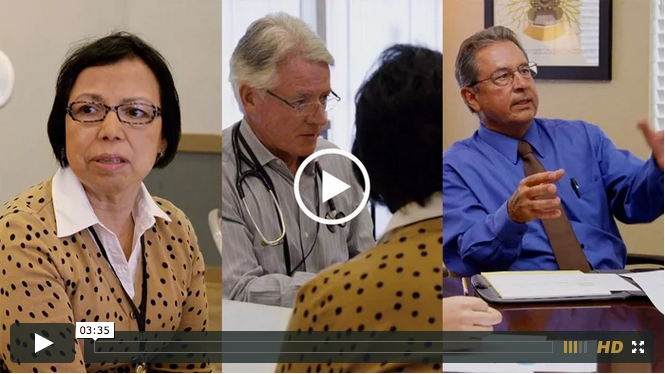
Meet Russ Perlich
2015 Piper Trust Encore Career Prize Awardee
Download or Print Story
RUSS PERLICH
$50,000 ENCORE CAREER PRIZE, 2015
By Jennifer Dokes
Jennifer Dokes, founder of JDD Specialties LLC, is a former longtime member of The Arizona Republic editorial board.
Russ Perlich is in a prime spot at a live performance he has seen many times during the past few years. His favorite part is coming up, and, as always, he’s immersed in the hit production. It never gets old.
The special moment comes when the theater is empty, cast members are backstage and ushers await the nearly sold-out crowd. The play starts in 30 minutes, but for Perlich and his supporting cast, it’s already showtime.
“Do what you need to do so that someday, you can do what you want to do. This is what I want to do.”
–Russ Perlich, Act One Founder
Act One, the nonprofit Perlich, a retired CEO, and his wife, Linda (“Mac”), founded in 2011, has done everything necessary to get 500 students from underserved schools to the grandeur of a performance hall. It purchased tickets and arranged bus transportation, and it provided education materials to help children get the most from the experience. Act One has done this dozens of times for more than 75,000 Arizona students.
The performance center’s doors open. Here it comes. The moment. “Wow.”
Read MoreYou hear it as excited students stride through the stunning lobby and take their seats in a gorgeous theater. You see it in bright eyes that open a little wider to another world. Life-enriching seeds of transformation are planted and the play hasn’t even begun.

A student enjoys the performance of “Sideways Stories From Wayside School.”
For many of these children, the Act One field trip is their first exposure to a live, high-quality performance. They all come from Title I public schools—those with a high percentage of students who live in low-income families. Circumstances are such at school and home that it may be a while before they get a similar arts experience. That’s simply their reality.
Perlich, through Act One, is determined to change the narrative. The longtime patron of the arts acts on the belief that it’s a different story for these kids and society when there is equitable access to creative nourishment.
Nailing the “Wow” moment is central to leaving a lasting impression and more. Studies show relevant, meaningful arts experiences have a tremendous impact on a child’s academic performance, social skills, and self-esteem. The awestruck “Wow” is a mechanism for achieving the self-empowering “What if.”
What if, the Perlichs wondered, all Arizona children were provided meaningful arts experiences that enhance their academic and creative potential? To address gross inequity in public education, they created Act One with proceeds from the sale of Russ’ business.
“We’re hopefully building creativity,” Perlich said. “We’re hopefully building curiosity. We’re hopefully building a what-if mindset: ‘If there are people on that stage doing something I’ve never seen before, what else is there? What if I was to do that? What if I could be part of something like that?’ ”
Seeds for Act One were planted 50 years ago in Russ’ arts-enriched public school education. They laid dormant until several years ago when the Perlichs were shocked to learn that Arizona students, particularly from underserved campuses, rarely, if ever, attend field trips. Years of budget cuts to education had pushed arts and culture adventures off school priority lists.
In Title I schools, at least 40 percent of the students qualify for free and reduced-price lunches. These schools focus, understandably, on more basic necessities than field trips—for example, ensuring hunger is addressed for students. Meanwhile, students on campuses serving higher-income neighborhoods typically have means and opportunity through school or home to benefit from attending high-quality arts performances.
What if, the Perlichs wondered, all Arizona children were provided meaningful arts experiences that enhance their academic and creative potential? To address gross inequity in public education, they created Act One with seed money from the sale of Russ’ business.
As a student in Minnesota public schools, Russ, regularly attended arts-related field trips. He distinctly remembers a performance of the Minnesota Orchestra. It was his first formal introduction to classical music and the start of a lifelong passion.
Listening to the low-key Perlich, a man who shuns the spotlight, it’s hard to imagine him ever exclaiming, “Wow,” not even as an excited youngster on a field trip. But decades later he talks about the impact of that experience and classical music. The symphony field trip is a note in the song of a long professional career and a rich family life that includes three daughters.
Reyna Rivera, a recent Arizona State University graduate now studying for a master’s degree in applied behavioral analysis, was among the first students to attend an Act One field trip. Her “Wow” moment was more like, “Oh, my goodness.”
“It was breathtaking,” Rivera said. “They have this structure walking into the Herberger. I remember looking up and it looked like water droplets. … There were students everywhere, but for that single moment, it felt like it was just me. … It was extraordinary.”
Rivera said she is certain she wouldn’t have experienced live theater without Act One. She traces some of her academic success and personal satisfaction to seeing those performances.
“My mom was working two jobs and she did try to expose me to literature early on,” Rivera said. “However, attending a theater performance was not feasible for her at the time. Act One provided that opportunity for several of us who had never even thought it was possible for us to attend.”
In 2012, Act One arranged for about 100 students from Maryvale High School to see a production of “The Great Gatsby.” Teacher Dixie Maxwell said that field trip, the instructional materials provided to students and teachers, and all the Act One-sponsored performances every year since have been “like a blessing from heaven.”
“This was the most wonderful miracle that had ever happened to me as a teacher, and I have taught for 42 years,” Maxwell said.
Answers to a lifetime of “What if” questions helped Perlich get to his prime spot in life and in the nonprofit world.
Shortly after earning a business degree from the University of Arizona, Perlich pursued the possibility of establishing a branch of the manufacturing business his family owned in Minnesota. He thought there was a market for the same products in Arizona. There wasn’t. But that period of discovery — of getting square with reality while imagining new possibilities — led in 1975 to Quadna, a custom engineering and manufacturing firm Perlich started from his home in Tucson.
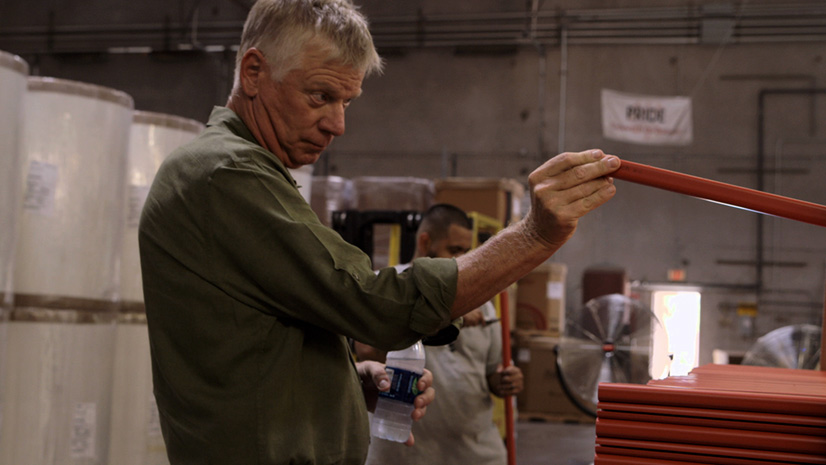
In 1975, Perlich founded Quadna a custom engineering and manufacturing firm.
Perlich’s company initially worked exclusively with the mining industry. It evolved constantly but slowly into a business creating fluid handling systems to meet a variety of needs for a multitude of industrial and municipal applications. Under Perlich’s leadership, Quadna expanded to locations in several states and Mexico; it had customers around the world and had grown to $60 million in top-line revenues.
When he sold Quadna in 2010, Perlich had plans for days filled with nothing but golf. He had no idea that creating “Wow” moments would be such an integral part of retirement.
When he sold Quadna in 2010, Perlich had plans for days filled with nothing but golf. He had no idea that creating “Wow” moments would be such an integral part of retirement.
“If I could define loosely his business personality, he was a driver,” said Al Priem, Perlich’s longtime business associate, who now serves as board chairman of Act One. “He was goal orientated and very much driven to accomplish his goals. He would lay out the aspirations and goals of the company to more senior management and the expectations in a certain time to accomplish them.”
That hasn’t changed in his transition to the nonprofit world.
“In order to plan where you’re going, you’ve got to know where you are,” Perlich said. “So, what’s the trend? What’s working? What’s not working? The only way I know how to do that is look at numbers. And you keep looking at numbers.”
Perlich makes clear that none of his successes are his alone. He surrounds himself with people with imaginations and drive. He married one. He hired others.
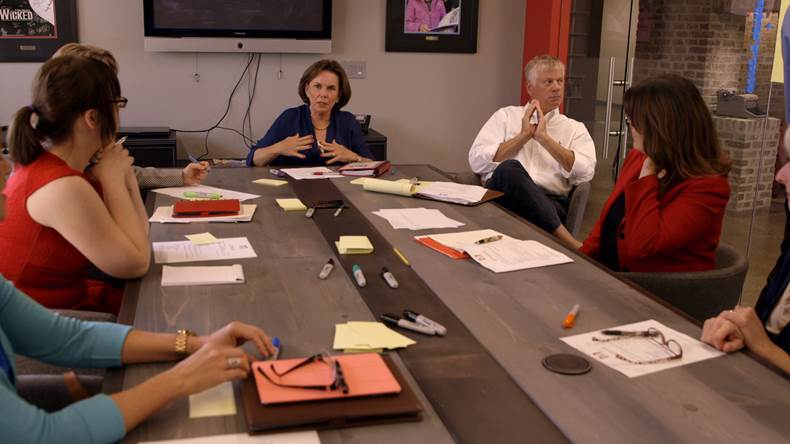
Mac (at head of table) and Russ Perlich strategize with Act One leadership.
Mac, a former nurse who shares his passion for the arts, watched Russ take his first steps with Quadna and learned from him what effective entrepreneurial, risk-taking looks like. They walk closely together now, practically joined at the hip, in his encore career with Act One.
“Russ has big picture vision, business strategy, and financial wisdom—and I enjoy creating partnerships and connections for Act One,” Mac said. Their combined strengths and shared commitment are a powerful force for change in the lives of tens of thousands of students.
Quadna employees also bought in to Perlich’s personal and corporate philosophy of giving back to the community. It wasn’t enough to donate money to charities. They were encouraged to give time and talent. Perlich led by example through his volunteer work, which included assisting in establishing First Tee of Tucson, a youth development program that was as much about teaching life skills as it was about golf mechanics.
“Russ has big picture vision, business strategy, and financial wisdom—and I enjoy creating partnerships and connections for Act One”
–Mac Perlich, Act One
After relocating Quadna to Phoenix in 2000, Perlich and his employees decided to focus their attention on a nearby middle school in the Roosevelt Elementary School District. The relationship evolved and grew. A school adoption would become a groundbreaking Teach for America corporate sponsorship. That led, among other things, to Quadna doing everything necessary to take about 800 students at Percy L. Julian School on a field trip to see “Henry V” at Herberger Theater.
When Perlich retired in 2010 from his for-profit business career, he pursued his plan to do nothing but golf. That lasted only a few months.
He served four months as interim executive director of Ballet Arizona, an experience that deepened his understanding of nonprofit business culture. The unusual degree of commitment and passion was something he didn’t see in the for-profit world. He liked it enough to want to do more.
Act One is the story of Perlich’s life—an encore production. The nonprofit is a reflection of everything that made him a successful businessman and philanthropist, and it is a testament to his desire to help ensure all children get a fair shake.
Marc Freedman, founder and CEO of San Francisco-based Encore.org, said Perlich is part of a pioneering group of millions of Americans who are in the midst of encore careers that are at the “intersection of passion purpose and a paycheck.” These people just aren’t passing through; they’re taking a stand and making a commitment to solve a significant problem, he said.
“With extended life and health, so many people have the opportunity not just to leave a legacy but to actually live one, and that’s clearly what Russ is doing,” Freedman said.
How is an Act One encore career like a Quadna career?
“It’s exactly the same,” Perlich said. “We designed something, we built it and we sold it and we got paid for it. And we did it in collaboration with a number of partners. “It’s what we’re doing here (with Act One).
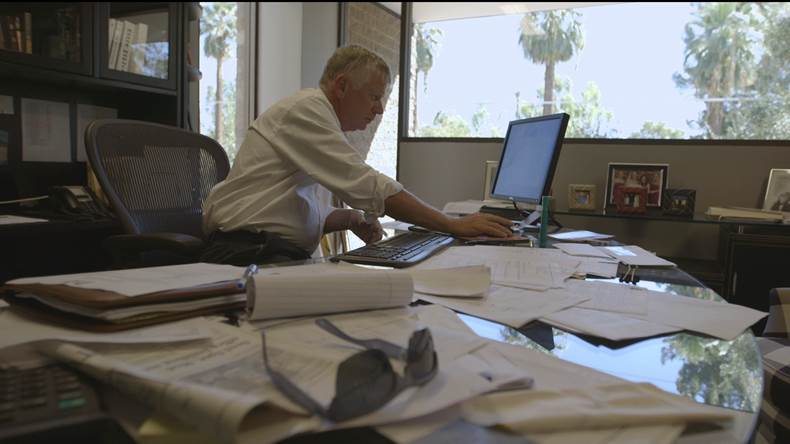
Russ in his Act One office.
“The customer is different. The customer is the student and the Title I school. The product that we hopefully are selling is creativity; that they walk out and wonder why and how. We’ve got partners; can’t do it without them. And the payment is in what you see going out the door as compared to what you see going in the door.”
By the end of the 2015-16 school year, Act One expects to serve more than 100,000 students through its field trip program. It’s reaching capacity, the point where there’s more demand than supply. Students may be turned away. That’s another reality for Act One to change.
Perlich’s understanding of capacity and his analysis of the arts and culture sector of the nonprofit world, tell him there’s also an opportunity at hand for sustainable growth and development for Act One. It will require partnerships and collaboration, not unlike the effective relationships Quadna built to carry out its business plan. It may require evolving, as Act One did in 2013 when it took stewardship of Culture Pass, a statewide program that provides library cardholders free tickets to events.
Perlich sees Act One’s programs as a way to serve children and their families and also help chronically struggling arts organizations with much-needed audience building.
“Russ had a great career,” Jennings-Roggensack said, “and instead of resting on his laurels, he really said, ‘How do I help where I live be a better place—for everyone?’ ”
Colleen Jennings-Roggensack, executive director for Arizona State University (ASU) Gammage and associate vice president cultural affairs for ASU, said students who benefit from Act One become part of, not excluded from, the equation for building the cultural life of our cities.
“Russ had a great career,” Jennings-Roggensack said, “and instead of resting on his laurels, he really said, ‘How do I help where I live be a better place—for everyone?’ ”
Act One is a custom-made, innovative solution to a clearly identified need. It follows a well thought-out business plan executed by people invested in its purpose.
And on many school days in Arizona performance halls, Act One is a symphony in motion. All the planning and collaboration that begins long before the start of a school year moves together in a thoughtfully choreographed, well-rehearsed production.
Fifteen minutes before Childsplay’s version of “Sideways Stories From Wayside School” at the Tempe Center for the Arts, the theater is filling with K-6 students bused from throughout the Phoenix area.
“Bottoms on seats. Feet on the floor,” a chaperone reminds her charges.
No problem. As soon as the students walked into the center, they respected the special space with its floor-to-ceiling windows two stories high, the infinity pool that seems to flow into Tempe Town Lake, the shiny brass railings, the artistic wood panels and the glass-sided walkway overhead leading to the balcony.
Nailing the “Wow”: Check
The set on stage sparks conversation among some students. Others swayed to “Roar,” Katy Perry’s pop anthem piped in softly. But there is no roaring now, just a respectful buzz until the house lights dimmed and then quiet.
Russ and Mac are seated in a prime spot to see both the performance and the audience. They often attend Act One field trips. There are 36 events currently on the calendar for this school year. More performances likely will be added.
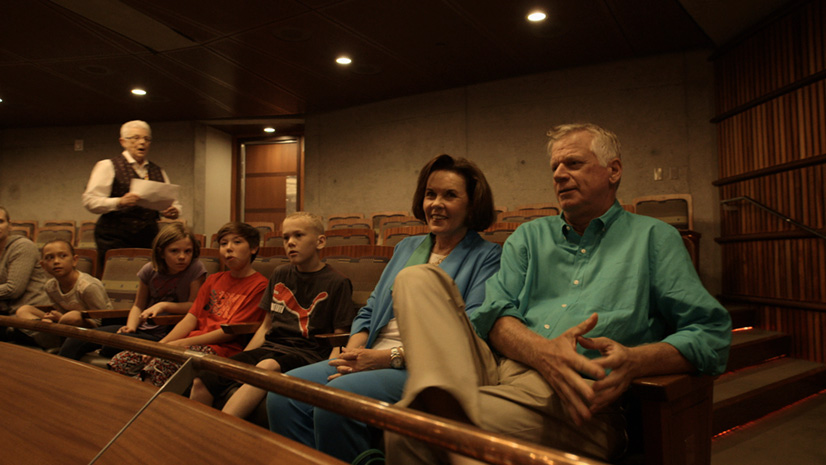
Russ and Mac join the students at a performance.
For 90 minutes, Childsplay took kids to another place on a journey that made them laugh and gasp. At the end, there were a few questions for cast members from the audience. How? Why?
And maybe unspoken but deeply planted, “What if …”




